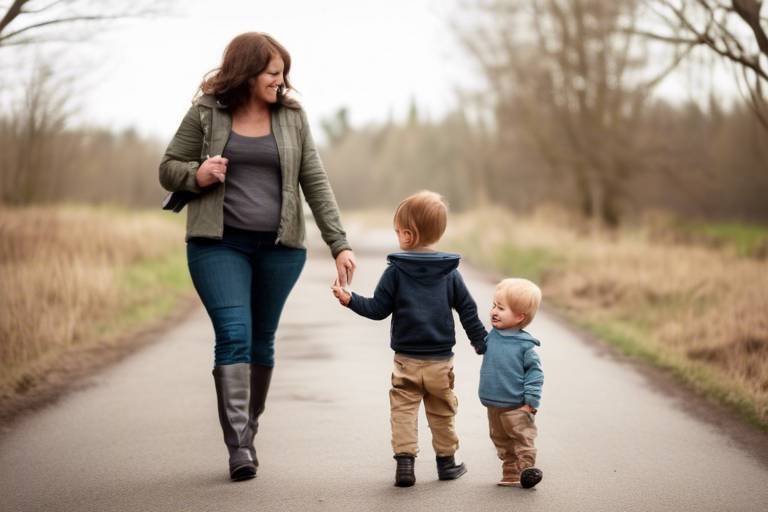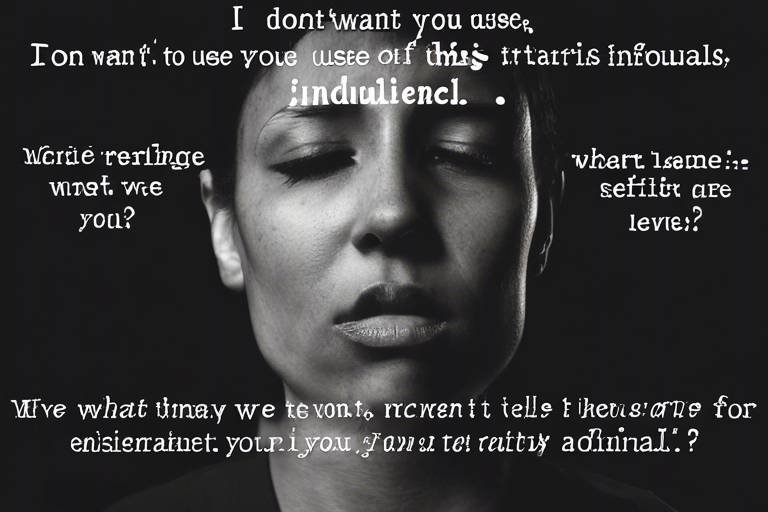Does Confidence Affect Your Love Life?
When it comes to love, confidence plays a pivotal role that many people often overlook. Have you ever noticed how some individuals just seem to radiate charm and magnetism? This isn't just luck; it's often rooted in their level of self-confidence. Confidence can significantly influence various aspects of romantic relationships, from attraction and communication to overall satisfaction. Imagine walking into a room full of potential partners; the person who stands tall, makes eye contact, and smiles naturally draws others in. This is the power of confidence in action.
But, what exactly is this connection between confidence and love? Well, it turns out that self-esteem not only shapes how we view ourselves but also how others perceive us. When we feel good about ourselves, we tend to project a positive aura that can be incredibly appealing. Think about it: if you believe you are worthy of love and happiness, that energy is palpable. It invites others to engage with you, creating a cycle of attraction and connection.
In romantic relationships, confidence can act like a secret ingredient, enhancing everything from initial attraction to long-term satisfaction. It's not just about how you feel but also about how you communicate and interact with your partner. So, how does this all play out in real life? Let's dive deeper into the ways confidence impacts our love lives.
Self-esteem is a crucial factor in attraction. Individuals with higher self-esteem are often perceived as more attractive and desirable by potential partners. This isn't just a random observation; studies have shown that people who believe in their worth tend to attract others who appreciate those qualities. When you carry yourself with confidence, you're sending a message that you value yourself, and that can be incredibly alluring.
Effective communication is vital in relationships. Confidence enhances communication skills, allowing individuals to express their feelings and needs more clearly and assertively. Imagine trying to tell your partner something important while feeling unsure of yourself. The message may get lost, or worse, misinterpreted. However, when you're confident, you can articulate your thoughts and emotions without hesitation, leading to deeper understanding and connection.
Many people struggle with expressing themselves, often due to fear of judgment or rejection. Here’s where confidence shines. It helps individuals overcome these barriers, leading to healthier relationship dynamics. When you believe in your right to express your feelings, you're more likely to engage in open, honest conversations. This can transform your relationship, making it a safe space for both partners to share and grow.
Non-verbal cues play a significant role in communication. Confident body language can positively affect interactions and perceptions in romantic settings. Standing tall, maintaining eye contact, and using open gestures can convey confidence even before you say a word. This body language not only reflects how you feel about yourself but also influences how others perceive you. It's like an unspoken language that can either draw someone closer or push them away.
Confidence fosters active listening skills. When you are self-assured, you're more likely to engage meaningfully in conversations. This means not just hearing your partner's words but truly understanding their feelings and perspectives. Active listening strengthens connections, making your partner feel valued and respected, which is crucial for any healthy relationship.
Trust is foundational in relationships. Confidence can help individuals build and maintain trust with their partners, enhancing relationship stability. When you communicate openly and assertively, you create an environment where trust can flourish. Your partner feels secure knowing that you are honest and confident in your feelings, which lays the groundwork for a lasting bond.
Confidence not only affects attraction but also relationship satisfaction. Studies have linked self-assuredness with higher levels of happiness and fulfillment in romantic partnerships. When both partners feel confident in themselves and their relationship, it creates a positive feedback loop that enhances overall satisfaction.
Confident individuals are often better at resolving conflicts. When faced with disagreements, those with higher self-esteem are more likely to approach the situation calmly and constructively. They can express their needs without resorting to defensiveness, which paves the way for healthier conflict management strategies.
Finally, let's talk about long-term relationship success. There’s a strong correlation between confidence and the ability to maintain fulfilling partnerships over time. Self-assured individuals are more likely to navigate the ups and downs of a relationship with grace, ensuring that both partners feel valued and understood.
- How can I improve my confidence in relationships? Start by working on self-acceptance and recognizing your worth. Engage in activities that make you feel good about yourself.
- Does confidence guarantee a successful relationship? While confidence is a significant factor, other elements like communication, trust, and compatibility also play crucial roles.
- Can a lack of confidence affect my love life? Yes, low self-esteem can lead to communication issues and difficulty in forming connections, impacting your romantic relationships.

The Role of Self-Esteem in Attraction
Self-esteem plays a crucial role in the dynamics of attraction. Imagine walking into a room filled with potential partners; the way you carry yourself can make a world of difference. Individuals with higher self-esteem often radiate a certain energy that draws others in, creating an aura of confidence and desirability. When someone believes in their own worth, it becomes evident in their interactions, making them more appealing to others. Studies have shown that people are generally more attracted to those who exhibit a strong sense of self, leading to a natural magnetism that can be hard to resist.
This doesn't mean that physical appearance is irrelevant; rather, it highlights the importance of inner confidence in shaping how others perceive us. For example, someone who feels good about themselves is more likely to smile, maintain eye contact, and engage in conversation, all of which are key factors in attraction. In contrast, individuals with low self-esteem may exhibit signs of insecurity, such as avoiding eye contact or appearing closed off, which can deter potential partners. Thus, self-esteem acts as a powerful filter that influences not only how we see ourselves but also how others see us.
Consider the following aspects of how self-esteem impacts attraction:
- Positive Self-Image: Those who view themselves positively are more likely to attract partners who share similar values and interests.
- Confidence in Dating: Individuals with high self-esteem are often more proactive in dating, taking the initiative to approach others and express their interest.
- Resilience: Higher self-esteem can lead to a greater ability to handle rejection, allowing individuals to bounce back and continue seeking healthy relationships.
In essence, the connection between self-esteem and attraction is undeniable. When you believe you are worthy of love and respect, you not only attract others but also set the tone for how you engage in relationships. The more confident you are in your own skin, the more likely you are to find someone who appreciates you for who you truly are. So, the next time you're feeling uncertain about your dating prospects, remember that confidence can be your greatest ally in the quest for love.

Confidence and Communication Skills
When it comes to relationships, effective communication is like the glue that holds everything together. But have you ever noticed how some people just seem to communicate effortlessly? They express their thoughts and feelings clearly, leaving little room for misunderstanding. The secret often lies in their level of confidence. You see, confidence isn’t just about walking into a room with your head held high; it’s about believing in your ability to express yourself and connect with others. When you feel good about yourself, it naturally translates into how you communicate.
Individuals with higher self-esteem tend to be more assertive in their communication. They’re not afraid to voice their opinions or share their feelings, which can be incredibly attractive to potential partners. Imagine you’re at a party, and someone is confidently sharing their thoughts on a topic. Their enthusiasm and self-assuredness draw people in, making them more engaging and relatable. On the flip side, when someone lacks confidence, they may hesitate to speak up, leading to missed opportunities for connection.
Moreover, confidence can help you articulate your needs and desires more effectively. It’s one thing to have feelings; it’s another to communicate them in a way that your partner understands. A confident person is more likely to say, “I need some time to myself” or “I really appreciate what you did for me.” This clarity not only helps in expressing oneself but also fosters a deeper understanding between partners, paving the way for a healthier relationship.
Many people struggle with expressing themselves, often due to fear of judgment or rejection. This is where confidence plays a crucial role. When you believe in yourself, those fears start to fade away. You become more willing to engage in conversations, even when the topics are sensitive or challenging. Think of it this way: confidence acts as a bridge over the river of insecurity, allowing you to reach the other side where open dialogue and understanding thrive.
Here are a few ways confidence helps in overcoming communication barriers:
- Reduced Anxiety: Confident individuals experience less anxiety in social situations, making them more relaxed and open during conversations.
- Willingness to Share: When you believe in your worth, you’re more likely to share your thoughts and feelings without fear of backlash.
- Assertiveness: Confidence allows you to assert your needs and boundaries clearly, which is essential in any relationship.
Let’s not forget about the power of non-verbal communication. Body language can speak volumes, often more than words themselves. When you exude confidence, your body language reflects that. You stand tall, maintain eye contact, and use open gestures, all of which create a welcoming atmosphere for dialogue. This positive body language invites your partner to engage with you more openly, enhancing the overall quality of your interactions.
Confidence also fosters active listening skills. A self-assured person is not only focused on expressing themselves but also genuinely interested in what their partner has to say. This kind of engagement is crucial for building a strong emotional connection. When you listen actively, you’re signaling to your partner that their thoughts and feelings matter. This mutual respect can significantly strengthen your bond, leading to deeper intimacy and understanding.
In conclusion, confidence plays a pivotal role in enhancing communication skills within romantic relationships. From overcoming barriers to improving body language and active listening, being self-assured allows individuals to express themselves more clearly and connect with their partners on a deeper level. So, the next time you're feeling unsure, remember that your confidence can be the key to unlocking more meaningful conversations and a more fulfilling love life.
- How can I build my confidence in communication? Start by practicing self-affirmations and engaging in conversations regularly to become more comfortable expressing yourself.
- What if my partner lacks confidence? Encourage open dialogue and create a safe space where they feel comfortable sharing their thoughts and feelings.
- Can confidence really improve my relationship? Absolutely! Confidence enhances communication, which is fundamental for a healthy and happy relationship.

Overcoming Communication Barriers
Communication can often feel like trying to navigate a maze—full of twists, turns, and sometimes dead ends. Many individuals find themselves grappling with the challenge of expressing their thoughts and feelings clearly, especially in romantic relationships. This struggle can stem from various factors, including fear of judgment, past experiences, or simply a lack of confidence. But here’s the good news: confidence can be a powerful tool in breaking down these barriers.
When someone feels confident, they are more likely to express their thoughts openly and honestly. This openness is crucial in romantic relationships, where misunderstandings can easily arise. Imagine trying to build a house without a solid foundation; that’s what communication is like without confidence. By fostering a sense of self-assuredness, individuals can create a sturdy base for their relationships. They become more willing to share their needs, desires, and concerns, which leads to healthier dynamics.
Moreover, confident individuals are often more receptive to feedback. When you're secure in yourself, you’re less likely to take constructive criticism personally. Instead of viewing feedback as a threat, you see it as an opportunity for growth. This perspective shift can transform conversations from potential conflicts into collaborative problem-solving sessions. For instance, if a partner expresses concern about something, a confident person will likely respond with curiosity rather than defensiveness, asking questions like, “What can I do to improve?” This approach not only resolves issues but also strengthens the bond between partners.
Another aspect of overcoming communication barriers is the ability to articulate thoughts and feelings clearly. Confidence enhances verbal skills, allowing individuals to convey their messages more effectively. When you believe in what you’re saying, your words carry weight. This is particularly important in romantic relationships, where emotional nuances matter. For example, instead of saying, “I don’t like it when you do that,” a confident person might express, “I feel hurt when that happens because it makes me feel unimportant.” This shift from a vague complaint to a specific expression of feelings can lead to more productive discussions.
In addition to verbal communication, non-verbal cues play a significant role in how messages are received. Confident individuals tend to exhibit positive body language—maintaining eye contact, using open gestures, and having a relaxed posture. These non-verbal signals not only enhance the clarity of their communication but also create a welcoming atmosphere for their partners. When you approach a conversation with open body language, it invites your partner to engage more fully, fostering a sense of safety and trust.
So, how can someone work on building this confidence? Here are a few strategies:
- Practice Self-Affirmation: Regularly remind yourself of your strengths and accomplishments.
- Set Realistic Goals: Start with small communication challenges, like expressing your opinion in a casual conversation.
- Seek Feedback: Ask trusted friends or partners for constructive feedback on your communication style.
- Engage in Active Listening: Focus on really hearing what your partner is saying; this builds confidence in your responses.
In conclusion, overcoming communication barriers is essential for nurturing healthy romantic relationships. Confidence acts as a catalyst, enabling individuals to express themselves authentically and engage meaningfully with their partners. By embracing self-assuredness, you not only enhance your communication skills but also pave the way for deeper connections and greater relationship satisfaction.
1. How can I build my confidence in communication?
You can build confidence by practicing self-affirmation, setting small communication goals, and engaging in active listening with your partner.
2. What are the signs of poor communication in a relationship?
Signs include frequent misunderstandings, avoidance of difficult conversations, and a lack of emotional connection during discussions.
3. Can confidence impact my partner's perception of me?
Absolutely! Confidence often makes individuals appear more attractive and desirable, enhancing overall relationship dynamics.

Body Language and Confidence
Have you ever noticed how some people just seem to light up a room with their presence? It’s not just their words; it’s their body language. Confidence is often reflected in the way we carry ourselves, and this can significantly influence our romantic interactions. When you walk into a room with your head held high, shoulders back, and a genuine smile, you’re not just showing confidence; you’re also sending a powerful message to those around you. This non-verbal communication can make a world of difference in how others perceive you.
Think about it: when someone approaches you with an open posture and steady eye contact, don’t you feel more inclined to engage with them? That’s the magic of confident body language. It’s like a silent invitation that says, “I’m here, I’m interested, and I’m ready to connect.” On the flip side, slouched shoulders and avoiding eye contact can come off as insecurity, which may deter potential partners from wanting to engage. In romantic settings, your body language can either be a magnet or a barrier, depending on how confident you feel.
To better understand the impact of body language on confidence, let’s take a look at some key aspects:
- Posture: Standing tall and maintaining an open stance can make you appear more approachable and self-assured.
- Eye Contact: Sustaining eye contact shows that you are engaged and interested in the person you’re speaking with, fostering a deeper connection.
- Gestures: Using hand gestures while speaking can help emphasize your points and make you seem more animated and confident.
Each of these elements plays a crucial role in how you are perceived by others. When you embody confidence through your body language, it not only enhances your attractiveness but also encourages a more positive interaction. Think of it as a dance; when both partners are in sync, the connection flows effortlessly. Conversely, if one partner is hesitant or closed off, the rhythm falters, leading to misunderstandings and missed opportunities.
Moreover, confident body language can also have a profound effect on your own feelings. Research has shown that adopting a confident posture can actually boost your self-esteem and help you feel more empowered. It’s a bit like putting on a superhero cape; by simply changing your stance, you can change your mindset. So, the next time you find yourself feeling a bit unsure, try standing tall and embracing that confident energy. You might be surprised at how your mood shifts and how others respond to you.
In summary, body language is a vital component of confidence that can greatly influence your love life. By being aware of how you present yourself non-verbally, you can enhance your interactions and attract the kind of relationships you desire. Remember, confidence is not just about feeling good; it’s about projecting that feeling into the world, inviting others to connect with you on a deeper level.
- How can I improve my body language to appear more confident?
Practice standing tall, maintaining eye contact, and using open gestures when communicating. - Does body language really affect attraction?
Yes! Positive body language can make you appear more approachable and attractive to potential partners. - Can practicing confident body language change my self-esteem?
Absolutely! Adopting a confident posture can lead to increased feelings of self-worth and empowerment.

Active Listening and Engagement
When it comes to romantic relationships, active listening is an essential skill that can significantly enhance the connection between partners. But what does it mean to truly listen? It goes beyond just hearing the words that are spoken; it involves being fully present, understanding the emotions behind those words, and responding thoughtfully. Confidence plays a pivotal role in this process. When individuals feel secure in themselves, they are more likely to engage genuinely in conversations, making their partners feel valued and heard.
Imagine you’re at a dinner party, and someone tells a story. If you’re confident, you’re not just nodding along; you’re making eye contact, leaning in, and asking follow-up questions that show you’re invested in the conversation. This kind of engagement fosters a deeper connection and encourages your partner to share more openly. On the flip side, if you’re feeling insecure, you might find yourself distracted, worrying about how you come across instead of focusing on your partner’s words. This disconnect can lead to misunderstandings and even resentment over time.
Moreover, active listening isn't just about the words; it also encompasses non-verbal communication. Confident individuals often exhibit positive body language, such as maintaining eye contact and using open gestures, which can create a welcoming atmosphere. This openness invites partners to express themselves more freely, knowing that their feelings will be met with understanding and respect. In contrast, closed-off body language can signal disinterest or discomfort, which may hinder meaningful exchanges.
To illustrate the impact of active listening and engagement, consider the following table that highlights the differences between confident and insecure communication styles:
| Aspect | Confident Communication | Insecure Communication |
|---|---|---|
| Eye Contact | Consistent and engaging | Avoidant or fleeting |
| Body Language | Open and inviting | Closed off or defensive |
| Response Style | Thoughtful and reflective | Defensive or dismissive |
| Emotional Engagement | Empathetic and responsive | Disengaged or indifferent |
Ultimately, the ability to engage in active listening not only strengthens the bond between partners but also fosters a sense of trust and security. When both individuals feel heard and understood, it creates a safe space for vulnerability, which is crucial for a healthy relationship. So, the next time you find yourself in a conversation with your partner, remember that your confidence can pave the way for meaningful engagement. By actively listening, you’re not just participating in the dialogue; you’re building a bridge of understanding that can carry your relationship through both calm and stormy seas.

Building Trust Through Confidence
Building trust in a relationship is akin to constructing a sturdy bridge; it requires solid materials, careful planning, and a lot of maintenance. One of the most crucial materials in this construction is confidence. When individuals exhibit confidence, they naturally inspire trust in their partners. This is because confident people tend to be more reliable, consistent, and transparent in their actions and words. Think about it: when someone is self-assured, they are less likely to engage in deceitful behavior or hide their feelings. Instead, they openly communicate their thoughts and emotions, fostering a sense of safety and security.
Moreover, confidence allows individuals to take responsibility for their actions. When mistakes happen—and let’s face it, they inevitably do—confident individuals are more likely to own up to them rather than deflect blame. This accountability is vital in building trust. For instance, if a partner forgets an important date, a confident person might say, “I’m really sorry I forgot our anniversary. I’ll make it up to you,” rather than making excuses. This kind of honesty is refreshing and reassuring, making it easier for the other partner to trust that they can rely on them in the future.
Additionally, confidence plays a pivotal role in how partners support each other through challenges. When one partner faces difficulties, a confident individual is more likely to offer encouragement and constructive feedback rather than criticism or doubt. This supportive behavior not only strengthens the bond between partners but also reinforces the idea that they are a team. In this context, trust grows because each partner feels valued and understood.
But how do we cultivate this confidence that is so essential for building trust? Here are a few strategies:
- Self-Reflection: Take time to understand your strengths and weaknesses. Acknowledging what you bring to the table can boost your self-esteem.
- Open Communication: Practice expressing your thoughts and feelings honestly. This not only builds your confidence but also encourages your partner to do the same.
- Set Boundaries: Knowing and communicating your limits fosters respect and trust in the relationship.
Ultimately, building trust through confidence is a continuous journey. It’s not something that happens overnight; it requires ongoing effort and dedication from both partners. As they nurture their self-assurance and trust in each other, they create a solid foundation for a lasting and fulfilling relationship.
- How can I improve my confidence in a relationship? Start by practicing self-affirmation and open communication with your partner. Engage in activities that make you feel good about yourself.
- What are some signs of a trusting relationship? Signs include open dialogue, mutual respect, and a sense of security where both partners feel comfortable expressing their thoughts and feelings.
- Can lack of confidence ruin a relationship? Yes, a lack of confidence can lead to communication issues, misunderstandings, and resentment, which can ultimately harm the relationship.

Impact of Confidence on Relationship Satisfaction
Confidence plays a pivotal role in shaping our experiences in romantic relationships. It’s fascinating to consider how our self-assuredness can ripple through various aspects of our love lives, affecting not only our attraction to potential partners but also the overall satisfaction we derive from our relationships. Studies have shown that individuals with higher levels of confidence tend to report greater happiness and fulfillment in their partnerships. But why is this the case? Let's delve deeper into the intricate connection between confidence and relationship satisfaction.
When we think about confidence, it’s essential to recognize that it influences our perceptions and interactions. A confident person is more likely to approach relationships with a positive mindset, believing they deserve love and respect. This belief can lead to a more fulfilling romantic experience, as they set higher standards for how they wish to be treated. Furthermore, confidence can act as a magnet, attracting partners who appreciate and resonate with that self-assured energy. In essence, confidence not only enhances attraction but also sets the stage for a more satisfying relationship dynamic.
Moreover, research supports the idea that self-esteem correlates with relationship satisfaction. For instance, a study conducted by the Journal of Personality and Social Psychology found that individuals with higher self-esteem reported greater satisfaction in their romantic relationships. This connection can be attributed to several factors:
- Healthy Boundaries: Confident individuals are more likely to establish and maintain healthy boundaries, ensuring that their needs are respected.
- Positive Interactions: A self-assured person tends to engage in more positive interactions, fostering a nurturing environment for both partners.
- Resilience to Challenges: Confidence equips individuals with the resilience to navigate challenges, leading to a more stable relationship.
Additionally, the way confidence influences conflict resolution cannot be overlooked. Confident individuals often approach disagreements with a constructive mindset, viewing them as opportunities for growth rather than threats. They are more likely to engage in open dialogues, express their feelings clearly, and listen to their partner's perspective. This proactive approach not only resolves conflicts more effectively but also strengthens the bond between partners, contributing to overall relationship satisfaction.
But what about long-term relationships? Confidence seems to play a crucial role here as well. Partners who exude self-assuredness are often more committed and invested in their relationships. They are less likely to tolerate unhealthy dynamics or settle for less than they deserve. As a result, these individuals are more likely to experience long-term satisfaction and fulfillment, creating a stable foundation for love to flourish.
In conclusion, the impact of confidence on relationship satisfaction is profound and multi-faceted. It shapes our interactions, influences our perceptions, and ultimately determines the quality of our romantic experiences. By fostering self-esteem and confidence, we not only enhance our own lives but also create a ripple effect that can lead to more fulfilling and satisfying relationships.
- How can I boost my confidence in relationships? Focus on self-care, set personal goals, and practice positive self-talk to enhance your self-esteem.
- Does confidence guarantee a happy relationship? While confidence is important, healthy communication and mutual respect are also crucial for relationship success.
- Can low confidence affect my relationship? Yes, low confidence can lead to insecurity, which may create tension and misunderstandings between partners.

Conflict Resolution and Confidence
When it comes to relationships, conflict is almost inevitable. However, how we handle those conflicts can make all the difference. Confidence plays a pivotal role in conflict resolution, acting as a catalyst that influences how we approach disagreements with our partners. Think of it like a sturdy bridge that allows you to cross turbulent waters; without that bridge, you might find yourself floundering in the chaos of unresolved issues.
Individuals with high self-esteem tend to approach conflicts with a sense of assurance, believing in their ability to navigate through tough conversations. This self-assuredness allows them to express their thoughts and feelings clearly, without resorting to defensiveness or aggression. In contrast, those lacking confidence may shy away from confrontation, leading to unresolved issues that fester over time. This avoidance can create a toxic cycle of resentment and misunderstanding, ultimately jeopardizing the relationship.
Moreover, confident individuals are often better equipped to listen actively during conflicts. They understand that resolving an issue isn't just about voicing their own perspective but also about understanding their partner's feelings. This active listening fosters an environment where both partners feel heard and valued, paving the way for more effective solutions. When both parties engage in a constructive dialogue, they can work together to find common ground, transforming conflict into an opportunity for growth.
To illustrate this point further, let’s consider a typical scenario in a romantic relationship:
| Scenario | Confident Approach | Low Confidence Approach |
|---|---|---|
| Disagreement over plans for the weekend | Expresses preferences openly, seeks compromise | Avoids discussion, agrees reluctantly |
| Addressing a hurtful comment | Communicates feelings directly, asks for clarification | Holds back feelings, fears confrontation |
| Managing differing opinions | Encourages dialogue, values partner's perspective | Becomes defensive, dismisses partner’s views |
As shown in the table, the confident approach is proactive and constructive, while the low-confidence approach often leads to further misunderstandings. The ability to approach conflicts with a positive mindset can significantly reduce the emotional toll that disagreements can take on a relationship.
Ultimately, confidence not only helps in resolving conflicts but also reinforces the bond between partners. When individuals feel secure in themselves, they are more likely to contribute positively to their relationship, making it easier to tackle challenges together. Building this confidence can take time and effort, but the rewards—greater understanding, respect, and love—are well worth it.
- How can I build my confidence for better conflict resolution? Start by practicing self-affirmations and reflecting on your strengths. Engaging in activities that boost your self-esteem can also help.
- What if my partner lacks confidence in conflict situations? Encourage open communication and create a safe space where they feel comfortable expressing themselves.
- Are there specific techniques for resolving conflicts confidently? Yes! Techniques such as active listening, staying calm, and focusing on solutions rather than blame can enhance your conflict resolution skills.

Long-Term Relationship Success
When it comes to , confidence plays a pivotal role that often goes unnoticed. Think about it: relationships are like plants; they need the right conditions to thrive. Just as a plant requires sunlight and water, a relationship flourishes when both partners possess a healthy level of self-assurance. Confident individuals tend to approach their relationships with a positive mindset, which can create a nurturing environment for love to grow. But how exactly does confidence contribute to sustaining a long-term partnership? Let's delve into some key aspects.
First and foremost, confident individuals are generally more open to vulnerability. This openness allows partners to share their thoughts, feelings, and fears without the fear of judgment. When both partners feel safe to express themselves, it fosters a deeper emotional connection. Imagine trying to build a sandcastle on a shaky foundation; it's bound to crumble. In contrast, a solid base of trust and vulnerability creates a sturdy structure for love to flourish.
Moreover, confidence enhances one’s ability to navigate the ups and downs of a relationship. Every couple faces challenges, but those who are self-assured approach these hurdles with a constructive attitude. They are less likely to take disagreements personally, viewing them as opportunities for growth rather than threats to their relationship. This perspective allows couples to resolve conflicts more effectively. Consider this: a confident person is like a skilled captain steering a ship through turbulent waters. They know how to adjust the sails and navigate the storm, ensuring the journey continues smoothly.
Another significant factor is the role of mutual respect in a confident relationship. When both partners exhibit self-assuredness, they are more likely to respect each other's opinions, needs, and boundaries. This mutual respect forms the bedrock of a healthy partnership. In fact, studies show that couples who respect each other are more likely to stay together long-term. They understand that love isn’t just about passion; it’s also about respecting one another as individuals.
Furthermore, confident individuals are typically better at setting and achieving personal goals, which can positively impact their relationships. When each partner is focused on their personal growth, it can lead to a more fulfilling partnership. Think of it as two trees growing side by side; as each tree grows taller and stronger, they provide more shade and support for one another. This dynamic can lead to a partnership where both individuals feel fulfilled and appreciated, which is essential for long-term success.
To summarize, confidence is not merely a personal trait; it’s a vital ingredient in the recipe for long-term relationship success. By fostering vulnerability, enhancing conflict resolution skills, promoting mutual respect, and encouraging personal growth, confidence lays the groundwork for a lasting and fulfilling partnership. So, the next time you reflect on your relationship, consider how your self-assurance and that of your partner can create a stronger bond that stands the test of time.
- How does confidence affect attraction?
Confidence can make individuals appear more attractive as it often correlates with positive body language and assertiveness. - Can a lack of confidence ruin a relationship?
Yes, low self-esteem can lead to communication issues and misunderstandings, which may strain the relationship. - What are some ways to build confidence for better relationships?
Engaging in self-care, setting achievable goals, and seeking supportive friendships can help boost confidence. - Is confidence more important than compatibility?
While compatibility is crucial, confidence can enhance the quality of the relationship and how partners interact with each other.
Frequently Asked Questions
- How does self-esteem influence attraction?
Self-esteem plays a significant role in attraction. Individuals with higher self-esteem are often perceived as more confident and desirable. This perception can make them more appealing to potential partners, as confidence often signals positivity and self-assuredness.
- Can confidence improve communication in relationships?
Absolutely! Confidence enhances communication skills by allowing individuals to express their thoughts and feelings more clearly. When someone feels secure in themselves, they are more likely to engage in open and honest conversations, which is crucial for any healthy relationship.
- What are some common communication barriers that confidence can help overcome?
Many people struggle with fear of judgment or rejection, which can hinder their ability to communicate effectively. Confidence helps individuals push past these barriers, enabling them to articulate their needs and feelings without fear, thereby fostering healthier relationship dynamics.
- How does body language relate to confidence?
Body language is a powerful form of non-verbal communication. Confident individuals tend to exhibit open and engaging body language, such as maintaining eye contact and using gestures. This positive body language can enhance interactions and create a more inviting atmosphere in romantic settings.
- Why is active listening important in a relationship?
Active listening is essential because it shows your partner that you value their thoughts and feelings. Confidence encourages individuals to listen intently and engage meaningfully in conversations, which strengthens connections and builds trust over time.
- How can confidence help build trust in a relationship?
Confidence fosters honesty and reliability, two key components of trust. When individuals are self-assured, they are more likely to communicate openly and consistently, which helps create a stable foundation for trust between partners.
- Does confidence impact overall relationship satisfaction?
Yes, it does! Studies have shown that individuals with higher confidence levels tend to report greater happiness and fulfillment in their romantic relationships. This satisfaction often stems from better communication, trust, and conflict resolution skills.
- How can confidence aid in conflict resolution?
Confident individuals are typically better at managing conflicts because they can express their viewpoints without aggression or defensiveness. This ability to communicate effectively during disagreements leads to healthier resolutions and a more harmonious relationship.
- What is the link between confidence and long-term relationship success?
Research suggests that confident individuals are more likely to maintain fulfilling partnerships over time. Their self-assuredness helps them navigate challenges, communicate effectively, and build strong connections, all of which are vital for long-term relationship success.



















